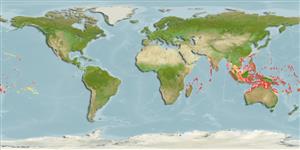Common names from other countries
>
Perciformes/Serranoidei (Groupers) >
Liopropomatidae (Painted basslets) > Diploprioninae
Etymology: Belonoperca: Greek, belone = needle; any fish with sharp pointed snout; also Pierre Belon, 1517-64, French zoologist born in Le Mans. Professor at the College de France, author of " La nature et diversité des poissons", 1551 + Greek, perke = perch (Ref. 45335).
More on authors: Fowler & Bean.
Environment: milieu / climate zone / depth range / distribution range
पारिस्थितिकी
समुद्री प्रवाल-भित्ति संयुक्त; गहराई सीमा 4 - 50 m (Ref. 9710). Tropical; 30°N - 23°S
Indo-Pacific: East Africa to Samoa, north to the Ryukyu Islands, south to New Caledonia.
आकार / वज़न / Age
Maturity: Lm ? range ? - ? cm
Max length : 15.0 cm TL पुल्लिंग / अलिंग; (Ref. 9710)
पृष्ठीय रीढ़ (सम्पूर्ण): 9; पृष्ठीय सौफट रेज़ (सम्पूर्ण): 10; गुदा कांटा 2; ऐनल सौफट रेज़: 8. Body brown in color (may also be dusky bluish grey to almost black (Ref. 48635)), caudal peduncle with saddle-like yellow spot; large ocellated black spot on spinous dorsal (Ref. 4326).
Occurs in steep slopes of coral rich areas. Usually hovers in mid water in caves (Ref. 9710). Nocturnal species (Ref. 4326). Secretive and solitary (Ref. 37816). Feeds on small fishes and crustaceans (Ref. 89972). Easily missed and normally the yellow spot is noticed first (Ref. 48635). Produces the skin toxin grammistin.
Life cycle and mating behavior
परिपक्व अवधि | पुनरुत्पत्ति | मछलीऔ का अंडे देना | अंडे | Fecundity | लार्वा
Randall, J.E., G.R. Allen and R.C. Steene, 1990. Fishes of the Great Barrier Reef and Coral Sea. University of Hawaii Press, Honolulu, Hawaii. 506 p. (Ref. 2334)
IUCN Red List Status (Ref. 130435)
CITES (Ref. 128078)
Not Evaluated
Threat to humans
Harmless
Human uses
अधिक जानकारी
आम नामउपशब्दचपायचयपरभक्षीईकोटोकसीकोलौजीपुनरुत्पत्तिपरिपक्व अवधिमछलीऔ का अंडे देनाFecundityअंडेEgg development
संदर्भजलीयकृषिजलीयकृषि रूपरेखाखींचआनुवंशिकीElectrophoresesहैरेटिबिलटीबीमारीप्रक्रमणMass conversion
साधन
Special reports
Download XML
इंटरनेट स्रोत
Estimates based on models
Preferred temperature (Ref.
115969): 25.8 - 28.8, mean 27.6 (based on 426 cells).
Phylogenetic diversity index (Ref.
82804): PD
50 = 0.7500 [Uniqueness, from 0.5 = low to 2.0 = high].
Bayesian length-weight: a=0.00389 (0.00180 - 0.00842), b=3.12 (2.94 - 3.30), in cm Total Length, based on all LWR estimates for this body shape (Ref.
93245).
Trophic level (Ref.
69278): 4.0 ±0.67 se; based on food items.
Fishing Vulnerability (Ref.
59153): Low vulnerability (10 of 100).
